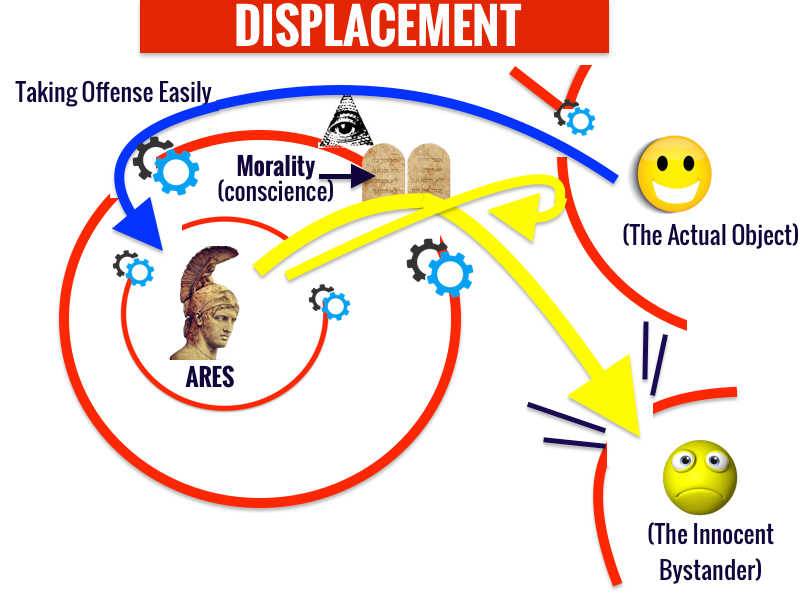Whenever you are in a relationship and are inexplicably getting blamed for something you didn’t do, it is very likely that this social habit is going on, especially if there is a “triangle” of relating.
For example, 1. you, 2. her, and 3. grandpa, or 1. you, 2. him, and 3. junior, or 1. you, 2. him, and 3. his boss, or 1. you, 2. her, and 3. her best friend.
Displacement occurs when, in the above, grandpa is dying of cancer, she is unconsciously furious at him for dying, and she is suddenly angry at you being five minutes late for visiting hours because you stopped at the gift shop to bring something nice up to the room.
Or when your son soiled his pants so badly in the church pew that it seeped out around the lining, and onto a hymnal, now you’ve got it on yourself and she is absolutely livid at you for not having tracked his bodily functions right before the service started.
Or when he comes home from work after the boss fired him (and rehired him) for the third time this month, and he barks at you why the heating bill is still sitting on the counter, since it should have been mailed this morning.
Or what it is like when her best friend (who’s recently broken up) is still sleeping on your living room couch two weeks after the breakup, only this particular evening, she has gone out on the town, returned home with jangling keys to the point of waking up the whole household, and must have vomited at some point because the couch definitely smells like that in the morning. You arise to find them sitting on the couch together in the morning, and ask, “What happened last night?” At which your mate jumps all over you and asks how you could dare ask that question.
What’s in common in all these stories of unexplainable anger at someone who did nothing wrong, and does not deserve to hear any blame, is that the real object of discontent is somehow “off limits” to vent that anger on - grandpa, who’s dying, the son who didn’t know any better, the boss, who pays the paycheck, or the best friend, who is a victim of a failed love. Since none of these culpable parties are acceptable targets of our ire, we let off the pressure on a third party, a bystander, but perhaps someone with whom we have other gripes or enough intimacy to intuit that at some level, they will help us process our feelings.
Call it, “Kick the Dog Syndrome,” as in the man who returns from a hard day of frustration at work, and kicks the dog out of the way in wrongful spite, collateral damage in his bad day, and certainly a cruel thing to do.
It is a social habit very rampant in families, where there is already a natural openness to intimate communication and emotional expression. Yet, when one or more members of the family has a great amount of work to do on their personal boundaries, a habit of displacement can abound.
This defense mechanism shifts sexual or aggressive impulses to a more acceptable or less threatening target. You might say that it “lets off steam on a safer target, in order to avoid directly addressing what is frightening or threatening - the death of grandpa, public embarrassment in church, being fired from work, or losing a best friend who disrespects your generosity.


